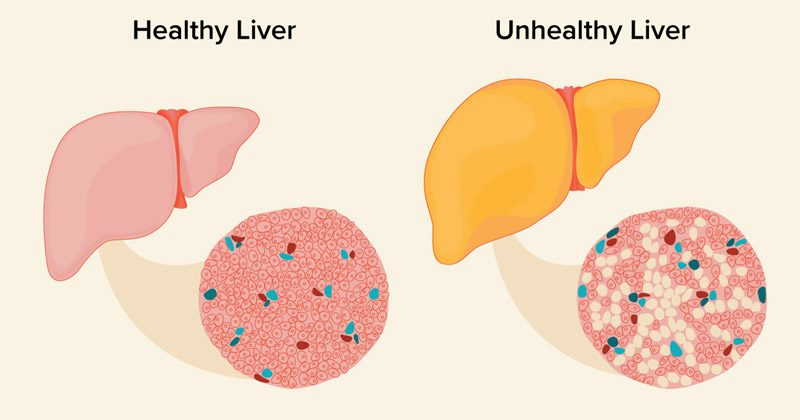In the past, the known triggers of fatty liver were alcohol and fat but they have been replaced in recent years by other causes. Today, the culprit of a bad liver is our convenient lifestyle in combination with industrially refined foods.
If your body weight is high and your food habits include high consumption of fast foods rather than healthy foods, you might need to consult the family doctor for the check-up of the liver. But, if you exercise regularly and enjoy fast foods and alcohol reasonably, both the liver and metabolism remain fit.
Fatty Liver is a Disease

Fatty liver is considered an independent disease because the phenomenon is not limited to one being overweight. Even among slim women and men, 15 per cent suffer from NAFLD (Non-alcoholic fatty liver disease). In overweight people, even 70 per cent are affected by fatty liver. The liver is considered less efficient if more than half of the liver cells store fat or the fat content of the liver is over five per cent. In addition to known evildoers such as sweets, coke, cakes or biscuits, some other culprits are the bread, cereals, pasta, rice, and potatoes.
If you instead spend your day in a desk chair, car seat and living room chair, the sugar in the body is not consumed entirely and when there is an excess of it in the body, it turns to fat thus making you overweight. Fatigue, exhaustion, indigestion, and migraine are typical calls for help from the liver. However, hardly any affected person perceives this connection.
How Liver Works
At 1.5 kilograms, the liver is the powerful engine of our energy budget. Connective tissue divides it into a left and a larger right lobe. At the bottom is the liver port. This is where all the important supply vessels come together. The portal vein transports all substances into the bloodstream via the intestine.
The liver enzymes in the blood are not automatically elevated. The more the liver gets fatigued, the more its tasks suffer. Blood sugar and lipid levels derail weight increases and the risk of high blood pressure, diabetes and arteriosclerosis increases. As a person affected, it is often difficult to understand that the most important metabolic organ is in distress because the fatty liver does not cause any pain.
Here are a few steps to save and revive your fatty liver
1. Walk

Move every day for at least 30 minutes through activities like brisk walking, cycling, weightlifting in the gym. It does not hurt if you get out of breath while walking.
2. Enjoy vital foods

Make vegetables, salads, fruits, mushrooms, legumes as well as virgin olive oil and fish fats, the priority of your daily diet. They fill the stomach and provide fiber, vitamins, and minerals and keep the liver healthy.
3. Avoid Sugar(specifically Fructose)

Sugar sounds harmless but today it is known that fructose increases fat production in the liver and blocks hormones that stop you from overeating. Avoid industrially produced fructose syrup from soft drinks, soft drinks, and finished products.
4. Enjoy alcohol with care

A healthy liver can easily break down alcohol but only up to a certain extent. Moderate consumption of alcohol even seems to protect the organ against obesity but it puts a heavy load on the organ’s capabilities when you consume large quantities of alcohol. Because the liver tries to break down the alcohol as quickly as possible, the combustion of all other nutrients is stopped and they end up as fat in the liver. If the liver is already affected, you should abstain from alcohol altogether.
5. Do not smoke

Cigarettes not only harm health in general, it promotes the conversion of cells to connective tissue in a fatty liver. One should either quit or reduce smoking to occasional consumption.
Also Read- These Are 8 Things To Eat During Dengue Fever For Quick Recovery
6. Put the liver on a diet

The long-term and most successful way to get rid of the lost fat in the liver is to eat sustainable, healthier and low-calorie food. If the body gets fewer calories than it needs, it gets the energy out of its stores thus reducing weight and burning the fat stored in the liver as well.
If you suffer from a fatty liver, you need to quickly start taking precautionary measures to control further damage because you only have one liver for life.


